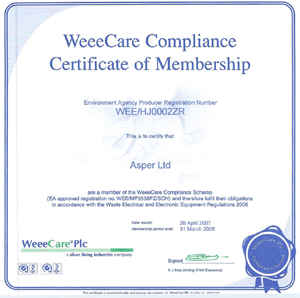 |
|
|
|
|
 |
|
|
|
|
RECYCLE PRODUCTWEEE (Waste Electrical & Electronics Environmental 2002/96/EC)The Waste Electrical and Electronic Equipment Directive (WEEE) aims to minimise the impacts of electrical and electronic equipment on the environment during
their life times and when they become waste. It applies to a huge
spectrum of products. It encourages and sets criteria for the
collection, treatment, recycling and recovery of waste electrical and
electronic equipment.
Asper System Ltd has a WeeeCare Compliance
Certificate of Membership
Environment Agency Producer Registration
Number : WEE/HJ0002ZR electronic equipment on the environment during
their life times and when they become waste. It applies to a huge
spectrum of products. It encourages and sets criteria for the
collection, treatment, recycling and recovery of waste electrical and
electronic equipment.
Asper System Ltd has a WeeeCare Compliance
Certificate of Membership
Environment Agency Producer Registration
Number : WEE/HJ0002ZR

On January 27, 2003, the European Union passed the "Restriction on Use of Hazardous Substances in Electrical and Electronic Equipment," or "RoHS" directive 2002/95/EC, which has an implementation date of July 1, 2006. All products manufactured by Asper System Ltd meet RoHs compliance from the implication date. RoHS (Restriction of Harmful Substances 2002/95/EC)The RoHS Directive will ban the placing on the EU market of new electrical and electronic equipment containing more than agreed levels of lead, cadmium, mercury, hexavalent chromium, polybrominated biphenyl (PBB) and polybrominated diphenyl ether (PBDE) flame retardants from 1 July 2006. There are a number of exempted applications for these substances. RoHS takes its scope broadly from the WEEE DirectiveBanned SubstancesHexavalent Chrome Also known as Chrome 6 (CR6) Hexavalent Chrome is a chemical used in the passivation of electro plating and is added to mechanical plating to create a corrosion resistant i.e. Zinc & Clear will have hexavalent chrome in the clear passivate, dacromet has hex chrome added to the coating. Hexavalent chrome is carcinogenetic (activates cancer within the body) and has been replaced by Trivalent chrome (also known as Chrome 3 or CR3), which is natural to the environment and the human body, therefore is safe to use and does not have a detrimental affect on the environment. There are differences in the performance between Hexavalent & Trivalent chrome, Trivalent does not self repair as does Hexavalent chrome therefore if scratched will rust. This is overcome by applying a wax on top of the passivate. This is called thick Trivalent, not only does it self repair but will then give a greater corrosion resistance. Without the wax the process is called thin Trivalent. There are other alternatives to this that platers may offer i.e. by adding cobalt to the plating. Lead Banned except for the following exemptions: Lead Allowance as an alloying element, therefore to improve machineability: Steel containing up to 0.35% lead by weight Copper Alloy containing up to 4% lead by weight Aluminium containing up to 0.4% lead by weight Also exempt is solder in electronic circuit boards and other applications Mercury Completely banned except for some applications that do not affect TR i.e. bulbs. Cadmium Polybrominated Biphenyls (PBB) Polybrominated Diphenyl Ethers (PBDE) |